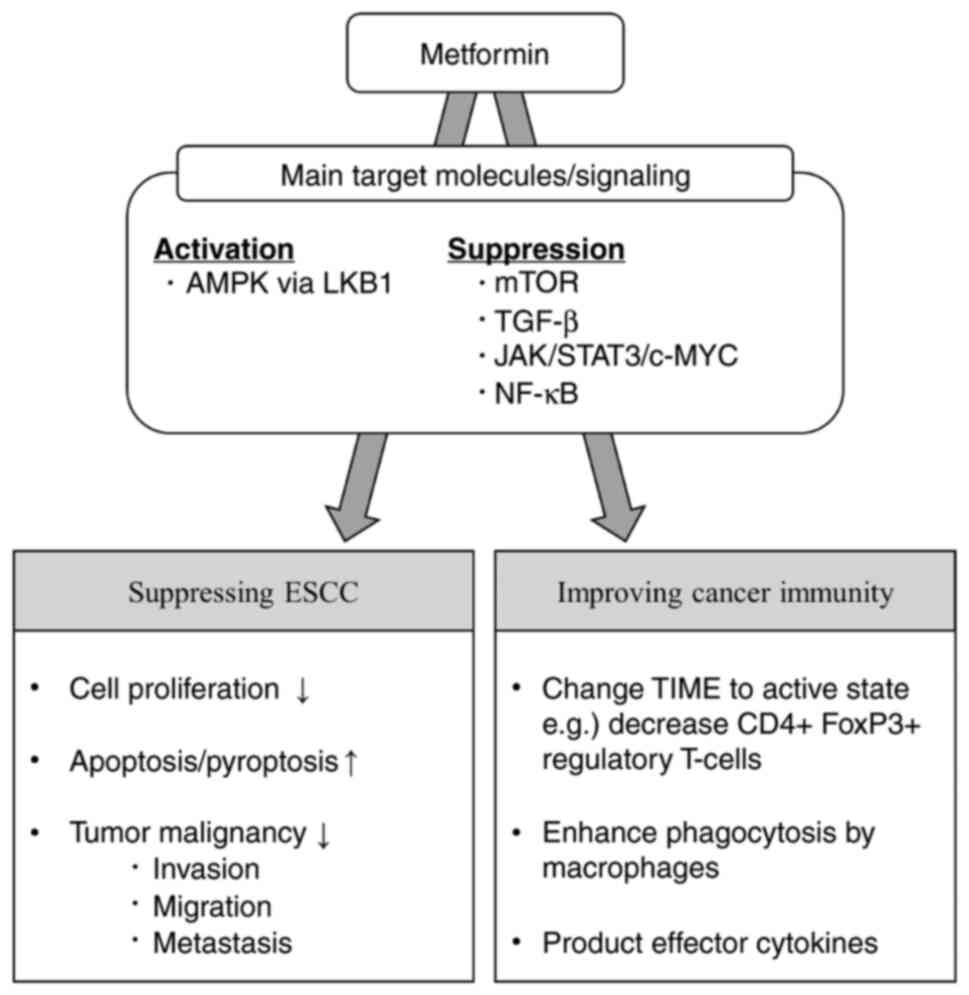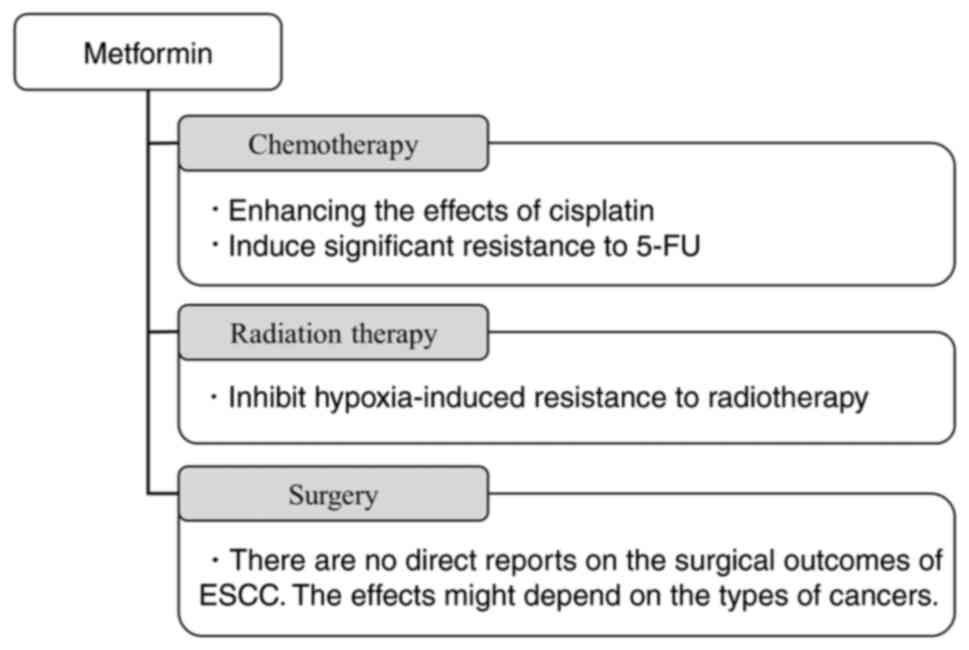|
1
|
Delman AM, Ammann AM, Turner KM, Vaysburg
DM and Van Haren RM: A narrative review of socioeconomic
disparities in the treatment of esophageal cancer. J Thorac Dis.
13:3801–3808. 2021.PubMed/NCBI View Article : Google Scholar
|
|
2
|
Pennathur A, Gibson MK, Jobe BA and
Luketich JD: Oesophageal carcinoma. Lancet. 381:400–412.
2013.PubMed/NCBI View Article : Google Scholar
|
|
3
|
Duan XF, Tang P, Shang XB, Jiang HJ and Yu
ZT: The prevalence of lymph node metastasis for pathological T1
esophageal cancer: A retrospective study of 143 cases. Surg Oncol.
27:1–6. 2018.PubMed/NCBI View Article : Google Scholar
|
|
4
|
Tachimori Y, Ozawa S, Numasaki H,
Fujishiro M, Matsubara H, Oyama T, Shinoda M, Toh Y, Udagawa H and
Uno T: Registration Committee for Esophageal Cancer of the Japan
Esophageal Society. Comprehensive registry of esophageal cancer in
Japan, 2009. Esophagus. 13:110–137. 2016.PubMed/NCBI View Article : Google Scholar
|
|
5
|
Kourelis TV and Siegel RD: Metformin and
cancer: New applications for an old drug. Med Oncol. 29:1314–1327.
2012.PubMed/NCBI View Article : Google Scholar
|
|
6
|
Tahrani AA, Varughese GI, Scarpello JH and
Hanna FWF: Metformin, heart failure, and lactic acidosis: Is
metformin absolutely contraindicated? BMJ. 335:508–512.
2007.PubMed/NCBI View Article : Google Scholar
|
|
7
|
Micic D, Cvijovic G, Trajkovic V, Duntas
LH and Polovina S: Metformin: Its emerging role in oncology.
Hormones (Athens). 10:5–15. 2011.PubMed/NCBI View Article : Google Scholar
|
|
8
|
Wang S, Lin Y, Xiong X, Wang L, Guo Y,
Chen Y, Chen S, Wang G, Lin P, Chen H, et al: Low-dose metformin
reprograms the tumor immune microenvironment in human esophageal
cancer: Results of a phase II clinical trial. Clin Cancer Res.
26:4921–4932. 2020.PubMed/NCBI View Article : Google Scholar
|
|
9
|
Hardie DG: Molecular pathways: Is AMPK a
friend or a foe in cancer? Clin Cancer Res. 21:3836–3840.
2015.PubMed/NCBI View Article : Google Scholar
|
|
10
|
Fan H, Yu X, Zou Z, Zheng W, Deng X, Guo
L, Jiang W, Zhan Q and Lu SH: Metformin suppresses the esophageal
carcinogenesis in rats treated with NMBzA through inhibiting
AMPK/mTOR signaling pathway. Carcinogenesis. 40:669–679.
2019.PubMed/NCBI View Article : Google Scholar
|
|
11
|
Wang F, Ding X, Wang T, Shan Z, Wang J, Wu
S, Chi Y, Zhang Y, Lv Z, Wang L and Fan Q: Metformin inhibited
esophageal squamous cell carcinoma proliferation in vitro and in
vivo and enhanced the anti-cancer effect of cisplatin. PLoS One.
12(e0174276)2017.PubMed/NCBI View Article : Google Scholar
|
|
12
|
Nakayama A, Ninomiya I, Harada S, Tsukada
T, Okamoto K, Nakanuma S, Sakai S, Makino I, Kinoshita J, Hayashi
H, et al: Metformin inhibits the radiation-induced invasive
phenotype of esophageal squamous cell carcinoma. Int J Oncol.
49:1890–1898. 2016.PubMed/NCBI View Article : Google Scholar
|
|
13
|
Wang L, Du L, Xiong X, Lin Y, Zhu J, Yao
Z, Wang S, Guo Y, Chen Y, Geary K, et al: Repurposing
dextromethorphan and metformin for treating nicotine-induced cancer
by directly targeting CHRNA7 to inhibit JAK2/STAT3/SOX2 signaling.
Oncogene. 40:1974–1987. 2021.PubMed/NCBI View Article : Google Scholar
|
|
14
|
Feng Y, Ke C, Tang Q, Dong H, Zheng X, Lin
W, Ke J, Huang J, Yeung SCJ and Zhang H: Metformin promotes
autophagy and apoptosis in esophageal squamous cell carcinoma by
downregulating Stat3 signaling. Cell Death Dis.
5(e1088)2014.PubMed/NCBI View Article : Google Scholar
|
|
15
|
Sekino N, Kano M, Matsumoto Y, Sakata H,
Akutsu Y, Hanari N, Murakami K, Toyozumi T, Takahashi M, Otsuka R,
et al: Antitumor effects of metformin are a result of inhibiting
nuclear factor kappa B nuclear translocation in esophageal squamous
cell carcinoma. Cancer Sci. 109:1066–1074. 2018.PubMed/NCBI View Article : Google Scholar
|
|
16
|
He Y, Tan X, Hu H, Wang Q, Hu X, Cai X,
Guan Y, Chen B and Jing X: Metformin inhibits the migration and
invasion of esophageal squamous cell carcinoma cells by
downregulating the protein kinase B signaling pathway. Oncol Lett.
15:2939–2945. 2018.PubMed/NCBI View Article : Google Scholar
|
|
17
|
Noto H, Goto A, Tsujimoto T and Noda M:
Cancer risk in diabetic patients treated with metformin: A
systematic review and meta-analysis. PLoS One.
7(e33411)2012.PubMed/NCBI View Article : Google Scholar
|
|
18
|
Wang QL, Santoni G, Ness-Jensen E,
Lagergren J and Xie SH: Association between metformin use and risk
of esophageal squamous cell carcinoma in a population-based cohort
study. Am J Gastroenterol. 115:73–78. 2020.PubMed/NCBI View Article : Google Scholar
|
|
19
|
Liang F, Wang YG and Wang C: Metformin
inhibited growth, invasion and metastasis of esophageal squamous
cell carcinoma in vitro and in vivo. Cell Physiol Biochem.
51:1276–1286. 2018.PubMed/NCBI View Article : Google Scholar
|
|
20
|
Cai X, Hu X, Tan X, Cheng W, Wang Q, Chen
X, Guan Y, Chen C and Jing X: Metformin induced AMPK activation,
G0/G1 phase cell cycle arrest and the inhibition of growth of
esophageal squamous cell carcinomas in vitro and in vivo. PLoS One.
10(e0133349)2015.PubMed/NCBI View Article : Google Scholar
|
|
21
|
Wang L, Li K, Lin X, Yao Z, Wang S, Xiong
X, Ning Z, Wang J, Xu X, Jiang Y, et al: Metformin induces human
esophageal carcinoma cell pyroptosis by targeting the miR-497/PELP1
axis. Cancer Lett. 450:22–31. 2019.PubMed/NCBI View Article : Google Scholar
|
|
22
|
Yu H, Bian X, Gu D and He X: Metformin
synergistically enhances cisplatin-induced cytotoxicity in
esophageal squamous cancer cells under glucose-deprivation
conditions. Biomed Res Int. 2016(8678634)2016.PubMed/NCBI View Article : Google Scholar
|
|
23
|
Peng J, Jing X, Wu J, Hong D, Hu X, Wang
Q, Hu H and Cai X: Metformin's effects on apoptosis of esophageal
carcinoma cells and normal esophageal epithelial cells: An in vitro
comparative study. Biomed Res Int. 2020(1068671)2020.PubMed/NCBI View Article : Google Scholar
|
|
24
|
Yang Y, Jin G, Liu H, Liu K, Zhao J, Chen
X, Wang D, Bai R, Li X, Jang Y, et al: Metformin inhibits
esophageal squamous cell carcinoma-induced angiogenesis by
suppressing JAK/STAT3 signaling pathway. Oncotarget. 8:74673–74687.
2017.PubMed/NCBI View Article : Google Scholar
|
|
25
|
Kunisada Y, Eikawa S, Tomonobu N, Domae S,
Uehara T, Hori S, Furusawa Y, Hase K, Sasaki A and Udono H:
Attenuation of CD4+CD25+ regulatory T cells
in the tumor microenvironment by metformin, a type 2 diabetes drug.
EBioMedicine. 25:154–164. 2017.PubMed/NCBI View Article : Google Scholar
|
|
26
|
Gatenby RA and Gillies RJ: Glycolysis in
cancer: A potential target for therapy. Int J Biochem Cell Biol.
39:1358–1366. 2007.PubMed/NCBI View Article : Google Scholar
|
|
27
|
Zhu Z, Jiang W, McGinley JN and Thompson
HJ: 2-Deoxyglucose as an energy restriction mimetic agent: Effects
on mammary carcinogenesis and on mammary tumor cell growth in
vitro. Cancer Res. 65:7023–7030. 2005.PubMed/NCBI View Article : Google Scholar
|
|
28
|
Shafaee A, Pirayesh Islamian J, Zarei D,
Mohammadi M, Nejati-Koshki K, Farajollahi A, Aghamiri SMR, Rahmati
Yamchi M, Baradaran B and Asghari Jafarabadi M: Induction of
apoptosis by a combination of 2-deoxyglucose and metformin in
esophageal squamous cell carcinoma by targeting cancer cell
metabolism. Iran J Med Sci. 44:99–107. 2019.PubMed/NCBI
|
|
29
|
Liu CC, Chou KT, Hsu JW, Lin JH, Hsu TW,
Yen DHT, Hung SC and Hsu HS: High metabolic rate and stem cell
characteristics of esophageal cancer stem-like cells depend on the
Hsp27-AKT-HK2 pathway. Int J Cancer. 145:2144–2156. 2019.PubMed/NCBI View Article : Google Scholar
|
|
30
|
Van De Voorde L, Janssen L, Larue R,
Houben R, Buijsen J, Sosef M, Vanneste B, Schraepen MC, Berbée M
and Lambin P: Can metformin improve ‘the tomorrow’ of patients
treated for oesophageal cancer? Eur J Surg Oncol. 41:1333–1339.
2015.PubMed/NCBI View Article : Google Scholar
|
|
31
|
Li PD, Liu Z, Cheng TT, Luo WG, Yao J,
Chen J, Zou ZW, Chen LL, Ma C and Dai XF: Redox-dependent
modulation of metformin contributes to enhanced sensitivity of
esophageal squamous cell carcinoma to cisplatin. Oncotarget.
8:62057–62068. 2017.PubMed/NCBI View Article : Google Scholar
|
|
32
|
Damelin LH, Jivan R, Veale RB, Rousseau AL
and Mavri-Damelin D: Metformin induces an intracellular reductive
state that protects oesophageal squamous cell carcinoma cells
against cisplatin but not copper-bis(thiosemicarbazones). BMC
Cancer. 14(314)2014.PubMed/NCBI View Article : Google Scholar
|
|
33
|
Mynhardt C, Damelin LH, Jivan R, Peres J,
Prince S, Veale RB and Mavri-Damelin D: Metformin-induced
alterations in nucleotide metabolism cause 5-fluorouracil
resistance but gemcitabine susceptibility in oesophageal squamous
cell carcinoma. J Cell Biochem. 119:1193–1203. 2018.PubMed/NCBI View Article : Google Scholar
|
|
34
|
Chevalier B, Pasquier D, Lartigau EF,
Chargari C, Schernberg A, Jannin A, Mirabel X, Vantyghem MC and
Escande A: Metformin: (Future) best friend of the radiation
oncologist? Radiother Oncol. 151:95–105. 2020.PubMed/NCBI View Article : Google Scholar
|
|
35
|
Chen F, Xu B, Li J, Yang X, Gu J, Yao X
and Sun X: Hypoxic tumour cell-derived exosomal miR-340-5p promotes
radioresistance of oesophageal squamous cell carcinoma via KLF10. J
Exp Clin Cancer Res. 40(38)2021.PubMed/NCBI View Article : Google Scholar
|
|
36
|
Fransgaard T, Thygesen LC and Gögenur I:
Association between metformin use after surgery for colorectal
cancer and oncological outcomes: A nationwide register-based study.
Int J Cancer. 143:63–72. 2018.PubMed/NCBI View Article : Google Scholar
|
|
37
|
Kaushik D, Karnes RJ, Eisenberg MS, Rangel
LJ, Carlson RE and Bergstralh EJ: Effect of metformin on prostate
cancer outcomes after radical prostatectomy. Urol Oncol.
32:43.e1–e7. 2014.PubMed/NCBI View Article : Google Scholar
|
|
38
|
Chan KM, Kuo CF, Hsu JT, Chiou MJ, Wang
YC, Wu TH, Lee CF, Wu TJ, Chou HS and Lee WC: Metformin confers
risk reduction for developing hepatocellular carcinoma recurrence
after liver resection. Liver Int. 37:434–441. 2017.PubMed/NCBI View Article : Google Scholar
|
|
39
|
Kaltenmeier C, Morocco B, Yazdani H, Reitz
K, Meyer K, Molinari M, Geller D and Tohme S: Impact of metformin
use on survival in patients undergoing liver resection for
colorectal cancer metastases. Am Surg. 87:1766–1774.
2021.PubMed/NCBI View Article : Google Scholar
|
|
40
|
Luo CS, Lin Y, Zhou WP and Shi J: Survival
advantage associated with metformin usage in hepatocellular
carcinoma patients with diabetes mellitus receiving radical
resection: A propensity score matching analysis. Eur J
Gastroenterol Hepatol. 32:1030–1035. 2020.PubMed/NCBI View Article : Google Scholar
|
|
41
|
Hanahan D and Weinberg RA: Hallmarks of
cancer: The next generation. Cell. 144:646–674. 2011.PubMed/NCBI View Article : Google Scholar
|
















